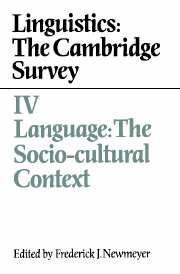Book contents
- Frontmatter
- Contents
- Contributors
- Preface
- 1 The study of language in its socio-cultural context
- 2 Language, culture, and world-view
- 3 Language and social class
- 4 Language and race: some implications for linguistic science
- 5 Language and gender
- 6 Bilingualism
- 7 Dialectology
- 8 Sociolinguistics and syntactic variation
- 9 Language birth: the processes of pidginization and creolization
- 10 Language death
- 11 Language planning: the view from linguistics
- 12 Ethnography of speaking: toward a linguistics of the praxis
- 13 The organization of discourse
- 14 Conversation analysis
- Index of names
- Index of subjects
- Contents of Volumes I, II, and III
4 - Language and race: some implications for linguistic science
Published online by Cambridge University Press: 05 June 2012
- Frontmatter
- Contents
- Contributors
- Preface
- 1 The study of language in its socio-cultural context
- 2 Language, culture, and world-view
- 3 Language and social class
- 4 Language and race: some implications for linguistic science
- 5 Language and gender
- 6 Bilingualism
- 7 Dialectology
- 8 Sociolinguistics and syntactic variation
- 9 Language birth: the processes of pidginization and creolization
- 10 Language death
- 11 Language planning: the view from linguistics
- 12 Ethnography of speaking: toward a linguistics of the praxis
- 13 The organization of discourse
- 14 Conversation analysis
- Index of names
- Index of subjects
- Contents of Volumes I, II, and III
Summary
Introduction
The relationship between language and racial groups has both a biological and a political dimension. The biological dimension first emerged historically as distinct genetic characteristics evolved among various human tribes in relative geographical isolation. Thus, in the typical case, language and race were originally correlated directly. But throughout history, linguistic change has been both rapid and drastic in comparison with the stability of the distinct racial groups. Thus the relative status and life expectancy of a language have come to be much more a function of the political and economic circumstances of its speakers than of their race per se. Indeed, the speech communities of influential world languages like English and Russian are multiracial, a fact that reflects their global expansion and great political and economic influence.
Whatever the evolutionary correlation may be between race and language, linguists hold all races – and the languages of their speakers – to be equal. Franz Boas and his student Edward Sapir eloquently stated the case for the equality of race and language respectively:
I believe the present state of our knowledge justifies us in saying that, while individuals differ, biological differences between races are small. There is no reason to believe that one race is by nature so much more intelligent, endowed with great will power, or emotionally more stable than another that the difference would materially influence its culture.
(Boas 1940: 13–14)- Type
- Chapter
- Information
- Linguistics: The Cambridge Survey , pp. 64 - 74Publisher: Cambridge University PressPrint publication year: 1988
- 4
- Cited by



